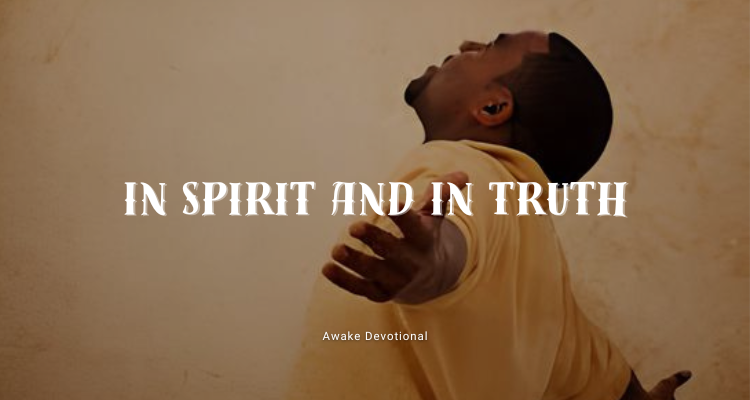
In Spirit and In Truth
John 4:24
John 4:23-24
New King James Version
23 “But the hour is coming, and now is, when the true worshipers will worship the Father in spirit and truth; for the Father is seeking such to worship Him.
24 God is Spirit, and those who worship Him must worship in spirit and truth.”
Many of us might associate worship with the slower songs sung in church, while the faster songs are often referred to as ‘praise.’ However, when you delve into the Bible, you’ll discover that worship goes far beyond this. So, what exactly is worship?
The first time the word translated as “worship” appears in the Bible is in the context of the sacrifice. God had declared Abraham the father of all nations and then instructed him to offer his only child at the age of 99.
This required a profound level of devotion, demonstrating that worship is much more than singing; it is about the posture of the heart—a posture of sacrifice. Worship is any action that reflects your response to the knowledge of God.
It is a lifestyle marked by surrender, gratitude, and devotion to our Heavenly Father, recognizing His greatness, love, and worthiness of our praise.
True worship begins with an understanding of God in His Word and what He expects of us, followed by absolute obedience. Worship is not about you, but about the one you worship. He is the creator and sustainer of the whole world, and we were created for His pleasure.
The Bible is filled with examples of individuals who have consistently dedicated themselves to wholehearted devotion and worship of God.
Revelation 4:10-11
New King James Version
10 “the twenty-four elders fall down before Him who sits on the throne and worship Him who lives forever and ever, and cast their crowns before the throne, saying:”
11 “You are worthy, O Lord, To receive glory and honor and power; For You created all things, And by Your will they exist and were created.”
These elders are in a perpetual state of reverence, continually bowing before God without ceasing. They are engaged in an eternal act of worship, devoting themselves entirely to honouring Him.
This unending worship is their profound response to the nature and majesty of God. It reflects their deep understanding of His holiness, power, and glory, acknowledging that He is worthy of constant adoration.
Their actions serve as a powerful testament to the greatness of God, illustrating that worship is not just an occasional act, but a continual and eternal response to who God is.
Another example is in:
Daniel 1:5-8
New King James Version
5 “And the king appointed for them a daily provision of the king’s delicacies and of the wine which he drank, and three years of training for them, so that at the end of that time they might serve before the king.”
6 “Now from among those of the sons of Judah were Daniel, Hananiah, Mishael, and Azariah.”
7 “To them the chief of the eunuchs gave names: he gave Daniel the name Belteshazzar; to Hananiah, Shadrach; to Mishael, Meshach; and to Azariah, Abed-Nego.”
8 “But Daniel purposed in his heart that he would not defile himself with the portion of the king’s delicacies, nor with the wine which he drank; therefore he requested of the chief of the eunuchs that he might not defile himself.”
Daniel purposed in his heart not to defile himself with the king’s food, even though the command came from someone in high authority. He remained steadfast in his commitment to God and emerged stronger because of it.
This is the kind of devotion we, as believers, should strive for. In today’s world, where the fear of missing out (FOMO) is prevalent (especially on social media platforms), determine in your heart to stay committed to God, just as Daniel did.
Daniel 6:7,10
New King James Version
7 “All the governors of the kingdom, the administrators and satraps, the counselors and advisors, have consulted together to establish a royal statute and to make a firm decree, that whoever petitions any god or man for thirty days, except you, O king, shall be cast into the den of lions.”
10 “Now when Daniel knew that the writing was signed, he went home. And in his upper room, with his windows open toward Jerusalem, he knelt down on his knees three times that day, and prayed and gave thanks before his God, as was his custom since early days.”
Despite the seriousness of the implications of Daniel praying to God, Daniel was still steadfast in his faith and did not alter his daily routine. Even when he was aware that the decree had been signed, he went home, entered his upper room, and, with his windows open toward Jerusalem, knelt down three times that day to pray and give thanks to God.
This was not a new practice for Daniel; it had been his custom since his early days. It was a vital part of his relationship with God, something he prioritized above all else.
If Daniel could remain faithful in the face of a decree that threatened his life, we should ask ourselves this question: what is holding us back from maintaining our spiritual disciplines, especially when we face far fewer obstacles?
There are times when our commitment to God may require us to make difficult choices regarding our jobs, relationships, and even friendships. Some environments and associations may hinder our devotion to God, and in such cases, we are called to prioritize our relationship with Him above all else.
This may mean stepping away from certain situations or people that conflict with our faith. We should strive to maintain a constant state of worship and devotion to God, ensuring that we prioritize our relationship with Him above all else, without allowing excuses to get in the way.
Prayer Point:
From today, I commit myself to a life of worship. I surrender every area of my life to God and I respond with a heart full of gratitude.
